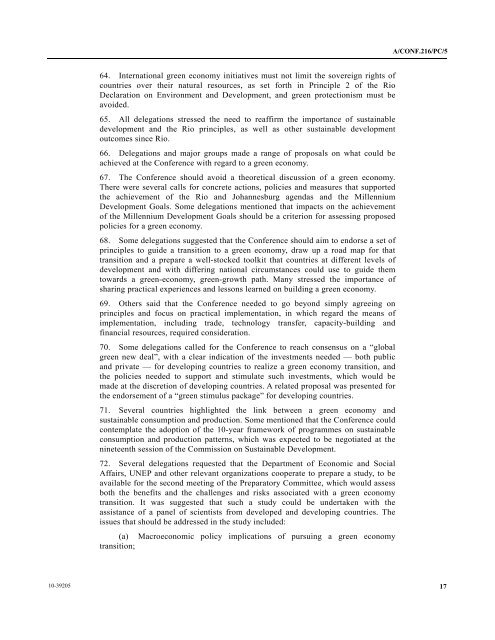General Assembly - UN Documents
General Assembly - UN Documents
General Assembly - UN Documents
You also want an ePaper? Increase the reach of your titles
YUMPU automatically turns print PDFs into web optimized ePapers that Google loves.
A/CONF.216/PC/5<br />
64. International green economy initiatives must not limit the sovereign rights of<br />
countries over their natural resources, as set forth in Principle 2 of the Rio<br />
Declaration on Environment and Development, and green protectionism must be<br />
avoided.<br />
65. All delegations stressed the need to reaffirm the importance of sustainable<br />
development and the Rio principles, as well as other sustainable development<br />
outcomes since Rio.<br />
66. Delegations and major groups made a range of proposals on what could be<br />
achieved at the Conference with regard to a green economy.<br />
67. The Conference should avoid a theoretical discussion of a green economy.<br />
There were several calls for concrete actions, policies and measures that supported<br />
the achievement of the Rio and Johannesburg agendas and the Millennium<br />
Development Goals. Some delegations mentioned that impacts on the achievement<br />
of the Millennium Development Goals should be a criterion for assessing proposed<br />
policies for a green economy.<br />
68. Some delegations suggested that the Conference should aim to endorse a set of<br />
principles to guide a transition to a green economy, draw up a road map for that<br />
transition and a prepare a well-stocked toolkit that countries at different levels of<br />
development and with differing national circumstances could use to guide them<br />
towards a green-economy, green-growth path. Many stressed the importance of<br />
sharing practical experiences and lessons learned on building a green economy.<br />
69. Others said that the Conference needed to go beyond simply agreeing on<br />
principles and focus on practical implementation, in which regard the means of<br />
implementation, including trade, technology transfer, capacity-building and<br />
financial resources, required consideration.<br />
70. Some delegations called for the Conference to reach consensus on a “global<br />
green new deal”, with a clear indication of the investments needed — both public<br />
and private — for developing countries to realize a green economy transition, and<br />
the policies needed to support and stimulate such investments, which would be<br />
made at the discretion of developing countries. A related proposal was presented for<br />
the endorsement of a “green stimulus package” for developing countries.<br />
71. Several countries highlighted the link between a green economy and<br />
sustainable consumption and production. Some mentioned that the Conference could<br />
contemplate the adoption of the 10-year framework of programmes on sustainable<br />
consumption and production patterns, which was expected to be negotiated at the<br />
nineteenth session of the Commission on Sustainable Development.<br />
72. Several delegations requested that the Department of Economic and Social<br />
Affairs, <strong>UN</strong>EP and other relevant organizations cooperate to prepare a study, to be<br />
available for the second meeting of the Preparatory Committee, which would assess<br />
both the benefits and the challenges and risks associated with a green economy<br />
transition. It was suggested that such a study could be undertaken with the<br />
assistance of a panel of scientists from developed and developing countries. The<br />
issues that should be addressed in the study included:<br />
(a) Macroeconomic policy implications of pursuing a green economy<br />
transition;<br />
10-39205<br />
17




